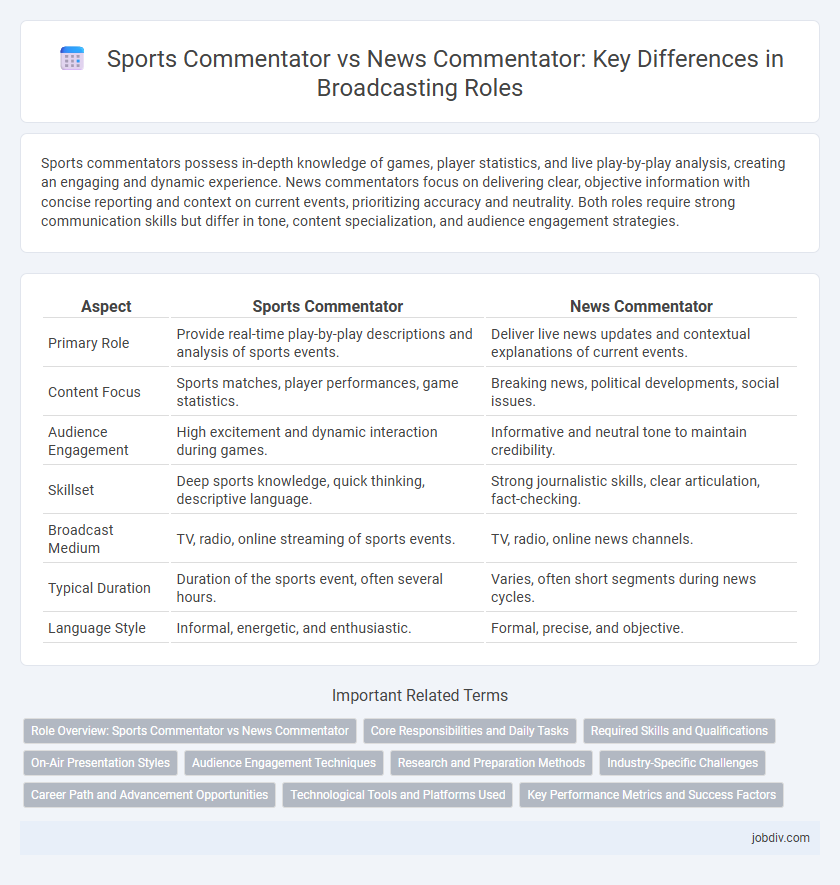Sports commentators possess in-depth knowledge of games, player statistics, and live play-by-play analysis, creating an engaging and dynamic experience. News commentators focus on delivering clear, objective information with concise reporting and context on current events, prioritizing accuracy and neutrality. Both roles require strong communication skills but differ in tone, content specialization, and audience engagement strategies.
Table of Comparison
| Aspect | Sports Commentator | News Commentator |
|---|---|---|
| Primary Role | Provide real-time play-by-play descriptions and analysis of sports events. | Deliver live news updates and contextual explanations of current events. |
| Content Focus | Sports matches, player performances, game statistics. | Breaking news, political developments, social issues. |
| Audience Engagement | High excitement and dynamic interaction during games. | Informative and neutral tone to maintain credibility. |
| Skillset | Deep sports knowledge, quick thinking, descriptive language. | Strong journalistic skills, clear articulation, fact-checking. |
| Broadcast Medium | TV, radio, online streaming of sports events. | TV, radio, online news channels. |
| Typical Duration | Duration of the sports event, often several hours. | Varies, often short segments during news cycles. |
| Language Style | Informal, energetic, and enthusiastic. | Formal, precise, and objective. |
Role Overview: Sports Commentator vs News Commentator
Sports commentators deliver live, dynamic narration of athletic events, focusing on play-by-play descriptions, player statistics, and game analysis to engage and inform viewers. News commentators provide in-depth explanations and interpretations of current events, offering context and insights to help audiences understand complex issues and societal impacts. Both roles require strong communication skills but differ significantly in content specialization and audience engagement style.
Core Responsibilities and Daily Tasks
Sports commentators analyze live game play, provide real-time statistics, and deliver engaging narration to enhance viewer experience during sports broadcasts. News commentators gather current information, interpret news stories, and present clear, concise updates to keep audiences informed throughout the day. Both roles require excellent communication skills, quick thinking, and thorough preparation to maintain accuracy and audience engagement.
Required Skills and Qualifications
Sports commentators require in-depth knowledge of specific sports, quick thinking, and the ability to provide real-time, engaging play-by-play analysis. News commentators must possess strong journalistic skills, including research proficiency, clear articulation, and the ability to present complex information objectively. Both roles demand excellent communication skills, but sports commentators emphasize dynamic storytelling, while news commentators prioritize factual accuracy and impartiality.
On-Air Presentation Styles
Sports commentators employ energetic and dynamic on-air presentation styles, using vivid descriptions and real-time analysis to capture the excitement of live events. News commentators adopt a more formal and measured delivery, emphasizing clarity and objectivity to convey factual information accurately. Both styles require strong vocal presence, but sports commentary thrives on enthusiasm while news commentary prioritizes neutrality.
Audience Engagement Techniques
Sports commentators utilize real-time play-by-play narration and vivid storytelling to heighten audience excitement, often incorporating statistics and player backgrounds to maintain engagement. News commentators focus on clarity, credibility, and concise delivery to effectively inform viewers, using expert interviews and verified data to build trust. Both employ tone modulation and pacing tailored to content, enhancing listener connection within their respective broadcasting formats.
Research and Preparation Methods
Sports commentators heavily rely on real-time data, player statistics, and historical game records to deliver dynamic and engaging narratives, often requiring quick analysis during live events. In contrast, news commentators prioritize thorough research of current affairs, verified sources, and background information to provide accurate, context-rich reporting with thoughtful analysis. Both roles demand meticulous preparation, but sports commentators emphasize rapid situational updates while news commentators focus on comprehensive topical understanding.
Industry-Specific Challenges
Sports commentators face the challenge of delivering real-time, dynamic play-by-play narration while maintaining audience engagement and accuracy amid fast-paced events. News commentators must navigate complex, often sensitive topics, ensuring factual integrity and impartiality while adapting to breaking news and diverse audience demographics. Both roles demand clear communication skills but diverge significantly in the immediacy and depth of content analysis required by broadcasting industry standards.
Career Path and Advancement Opportunities
Sports commentators typically begin their careers with a background in journalism or sports management, often starting at local radio or television stations before advancing to national broadcasts, driven by expertise in sports analysis and live event coverage. News commentators usually start in general news reporting or journalism degrees, gaining experience across various news beats, with advancement opportunities in major networks or specialized media outlets focusing on politics, economics, or global affairs. Both career paths demand strong communication skills and on-air presence, but sports commentators may advance by specializing in popular sports leagues, while news commentators progress through editorial roles or anchoring prime-time news segments.
Technological Tools and Platforms Used
Sports commentators leverage real-time data analytics, wearable technology, and interactive graphics platforms like ChyronHego to enhance live game coverage and fan engagement. News commentators utilize teleprompters, automated transcription software, and broadcast management systems such as ENPS to ensure timely and accurate delivery of information. Both rely on advanced audio-visual equipment and social media integration to connect with diverse audiences across multiple digital platforms.
Key Performance Metrics and Success Factors
Sports commentators excel in real-time analysis, audience engagement, and energy delivery, which are critical for maintaining viewer interest during live events. News commentators prioritize accuracy, clarity, and credibility, ensuring timely dissemination of information and trustworthiness in reporting. Both roles demand strong articulation and quick thinking, but sports commentary hinges on dynamic storytelling, while news commentary focuses on factual precision and context comprehension.
Sports Commentator vs News Commentator Infographic

 jobdiv.com
jobdiv.com